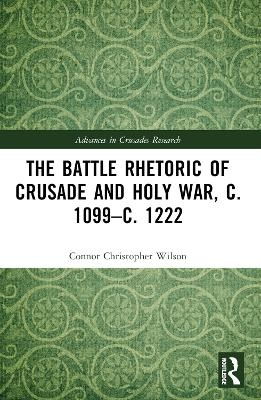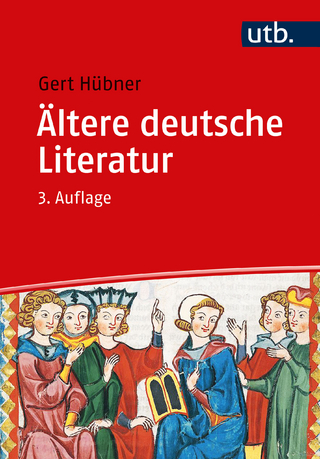
The Battle Rhetoric of Crusade and Holy War, c. 1099–c. 1222
Seiten
2024
Routledge (Verlag)
978-1-032-36530-5 (ISBN)
Routledge (Verlag)
978-1-032-36530-5 (ISBN)
This book examines Latin narratives produced in the aftermath of the First Crusade and challenges the narrative of supposed brutality and amorality of warfare in this period - instead focusing on the moral and didactic concerns surrounding warfare and violence with which medieval authors wrestled.
This book examines Latin narratives produced in the aftermath of the First Crusade and challenges the narrative of supposed brutality and amorality of warfare in this period--instead focusing on the moral and didactic concerns surrounding warfare and violence with which medieval authors wrestled.
The battle oration, a rousing harangue exhorting warriors to deeds of valour, has been regarded as a significant aspect of warfare since the age of Xenophon, and has continued to influence conceptions of campaigning and combat to the present day. While its cultural and chronological pervasiveness attests to the power of this trope, scholarly engagement with the literary phenomenon of the pre-battle speech has been limited. Moreover, previous work on medieval battle rhetoric has only served to reinforce the supposed brutality and amorality of warfare in this period, highlighting appeals to martial prowess, a hatred for ‘the enemy’ and promises of wealth and glory. This book, through an examination of Latin narratives produced in the aftermath of the First Crusade and the decades that followed, challenges this understanding and illuminates the moral and didactic concerns surrounding warfare and violence with which medieval authors wrestled. Furthermore, while battle orations form a clear mechanism by which the fledgling crusading movement could be explored ideologically, this comparative study reveals how non-crusading warfare in this period was also being reconceptualised in light of changing ideas about just war, authority and righteousness in Christian society.
This volume is perfect for researchers, students and scholars alike interested in medieval history and military studies.
This book examines Latin narratives produced in the aftermath of the First Crusade and challenges the narrative of supposed brutality and amorality of warfare in this period--instead focusing on the moral and didactic concerns surrounding warfare and violence with which medieval authors wrestled.
The battle oration, a rousing harangue exhorting warriors to deeds of valour, has been regarded as a significant aspect of warfare since the age of Xenophon, and has continued to influence conceptions of campaigning and combat to the present day. While its cultural and chronological pervasiveness attests to the power of this trope, scholarly engagement with the literary phenomenon of the pre-battle speech has been limited. Moreover, previous work on medieval battle rhetoric has only served to reinforce the supposed brutality and amorality of warfare in this period, highlighting appeals to martial prowess, a hatred for ‘the enemy’ and promises of wealth and glory. This book, through an examination of Latin narratives produced in the aftermath of the First Crusade and the decades that followed, challenges this understanding and illuminates the moral and didactic concerns surrounding warfare and violence with which medieval authors wrestled. Furthermore, while battle orations form a clear mechanism by which the fledgling crusading movement could be explored ideologically, this comparative study reveals how non-crusading warfare in this period was also being reconceptualised in light of changing ideas about just war, authority and righteousness in Christian society.
This volume is perfect for researchers, students and scholars alike interested in medieval history and military studies.
Connor Christopher Wilson is an historian of the early and central Middle Ages, with a particular interest in the Crusades, the Crusader States, monasticism and monastic writing. His PhD thesis was completed in 2018 at Royal Holloway, University of London. He has lectured in History at Lancaster University.
1. The Battle Oration and Classical Rhetoric 2. ‘No war of the flesh, but of the spirit’: The Battle Rhetoric of Penitential Pilgrimage 3. The Victory of the familia Christi and the Development of Crusade Ideology 4. Justice, Authority and Legitimate Violence in Holy War 5. Vengeance, Martyrdom and Heroic Failure in Military Service to Christ
| Erscheinungsdatum | 04.08.2023 |
|---|---|
| Reihe/Serie | Advances in Crusades Research |
| Verlagsort | London |
| Sprache | englisch |
| Maße | 156 x 234 mm |
| Gewicht | 508 g |
| Themenwelt | Geschichte ► Allgemeine Geschichte ► Mittelalter |
| Geisteswissenschaften ► Geschichte ► Regional- / Ländergeschichte | |
| Geschichte ► Teilgebiete der Geschichte ► Militärgeschichte | |
| Geisteswissenschaften ► Sprach- / Literaturwissenschaft ► Anglistik / Amerikanistik | |
| Geisteswissenschaften ► Sprach- / Literaturwissenschaft ► Literaturwissenschaft | |
| ISBN-10 | 1-032-36530-7 / 1032365307 |
| ISBN-13 | 978-1-032-36530-5 / 9781032365305 |
| Zustand | Neuware |
| Haben Sie eine Frage zum Produkt? |
Mehr entdecken
aus dem Bereich
aus dem Bereich
eine neue Geschichte des Mittelalters
Buch | Hardcover (2023)
C.H.Beck (Verlag)
38,00 €


